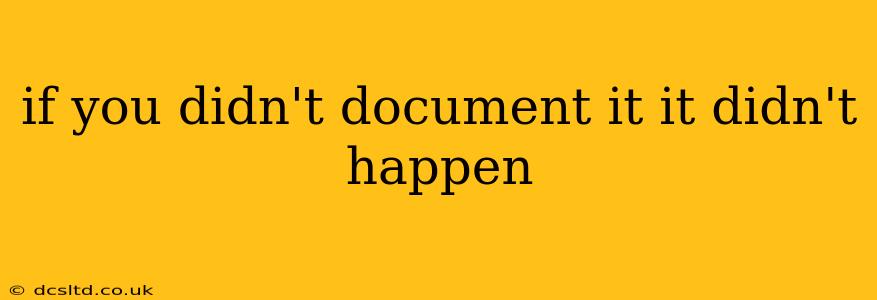If You Didn't Document It, It Didn't Happen: The Power of Documentation in Every Aspect of Life
The adage, "If you didn't document it, it didn't happen," rings true across various aspects of life, from professional endeavors to personal projects. While seemingly harsh, this principle underscores the crucial role documentation plays in accountability, efficiency, and success. This post delves into the importance of meticulous record-keeping and explores its application in diverse contexts.
Why is Documentation So Important?
Proper documentation acts as a safeguard against disputes, memory lapses, and missed opportunities. It provides irrefutable evidence of actions taken, decisions made, and progress achieved. This is especially critical in:
-
Professional Settings: In business, legal, and scientific fields, documentation is paramount. Contracts, meeting minutes, project updates, and research notes are all vital for maintaining transparency, tracking progress, and mitigating risk. Without thorough documentation, disputes can arise, projects can stall, and valuable intellectual property can be lost.
-
Personal Projects: Even personal endeavors benefit from careful documentation. Whether you're renovating a house, writing a book, or learning a new skill, keeping track of your progress, challenges, and solutions can save time, prevent errors, and provide a valuable record of your journey.
-
Legal Matters: In legal contexts, documentation is often the deciding factor in disputes. Detailed records can protect your rights and interests, ensuring that you have the evidence needed to support your claims. This includes everything from financial transactions to communication logs.
What Types of Documentation Are Essential?
The specific types of documentation needed will vary depending on the context, but some common forms include:
-
Written Records: These are essential for capturing details, plans, and results. This can include emails, memos, reports, notes, contracts, and spreadsheets.
-
Visual Documentation: Photographs, videos, and screen recordings can be invaluable in providing visual evidence of events, processes, and results. They're especially useful in situations where written records alone might not be sufficient.
-
Audio Recordings: In certain situations, audio recordings can capture conversations and meetings, preserving key information that might otherwise be lost.
How Can I Improve My Documentation Practices?
Effective documentation isn't about creating excessive paperwork; it's about strategically recording essential information in a clear, concise, and accessible manner. Consider these tips:
-
Establish a System: Develop a consistent system for organizing and storing your documents. This could involve using a cloud-based storage system, a dedicated filing cabinet, or a project management software.
-
Be Consistent: Maintain consistent documentation practices throughout your projects or endeavors. Don't wait until a problem arises to start documenting.
-
Use Clear and Concise Language: Avoid jargon or ambiguous terms. Make sure your documents are easily understood by anyone who needs to access them.
-
Regularly Review and Update: Regularly review and update your documents to ensure they are accurate and up-to-date.
What are the consequences of poor documentation?
Neglecting documentation can lead to a range of negative outcomes:
-
Lost Time and Resources: Without clear records, it can be difficult to track progress, identify problems, and make informed decisions. This can lead to wasted time and resources.
-
Legal Issues: Poor documentation can make it difficult to defend your position in legal disputes.
-
Damaged Reputation: Inconsistent or inaccurate documentation can damage your credibility and reputation.
-
Missed Opportunities: Failing to document successes and innovations can prevent you from capitalizing on valuable opportunities.
What are some examples of good documentation?
- A meticulously maintained lab notebook in a scientific experiment.
- Detailed meeting minutes that include action items and assigned responsibilities.
- A comprehensive project plan outlining timelines, deliverables, and responsibilities.
- A well-organized portfolio showcasing past work and accomplishments.
In conclusion, the phrase "If you didn't document it, it didn't happen" serves as a powerful reminder of the critical role documentation plays in every aspect of life. By adopting meticulous documentation practices, you can protect yourself, enhance your efficiency, and pave the way for greater success. The effort you invest in documentation will undoubtedly pay dividends in the long run.
